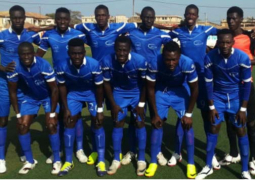A two-day sub-regional meeting on vaccines against neglected animal diseases in Africa (VACNADA) project ended yesterday at the Kairaba Beach Hotel in Kololi.
The forum, which drew participants from
In his speech on behalf of the deputy Minister of Agriculture, Kalifa Kambi, the PS Alfu Marong of the Agriculture ministry expressed profound gratitude to the African Union Inter-African Bureau Animal Resources (AU-IBAR) for selecting The Gambia to host the meeting of technicians in the control of trans-boundary animal diseases.
“We in The Gambia acknowledge and recognize the important role of AU-IBAR in the development of the animal resources sector in the African continent,” he said, adding that AU IBAR has been instrumental in the eradication of Rinderpest and contagious Bovine Pleuro Pneumonia (CBPP) in The Gambia and other countries, through projects and programmes such as the Joint Project 15 (JP15), the pan-African rinderpest control programmes (PARC) and the pan-African programme for control of Epizootics (PACE).
He added that the last case of Rinderpest was reported in the
He also said the joint implementation of the VACNADA programme in these four countries would significantly contribute to the socioeconomic development of the region.
“It will also control building the capacity of technicians in the area of disease surveillance and laboratory diagnosis,” he said.
According to him, the
For his part, Dr Samuel Wakhusama, Coordinator of the VACNADA Project, said cognizant of the effect of soaring food prices in developing countries and their populations, the European Parliament and the Council of the European Union adopted a regulation in December 2008 establishing a Food Facility with a budget of €1 billion to be spent over three years in developing countries.
He added that the VACNADA Project was developed by the AU-IBAR in collaboration with the Global Alliance for Livestock Veterinary Medicines (GALVmed), the African Union Pan African Veterinary Vaccine Centre (AU-PANVAC) and the Centre for the International Cooperation in Agronomic Research for Development (CIRAD) with financial support from the Food Facility of the European Union.
He revealed that the project is being implemented over a 20-month period which started from January 2009.
“The overall objective of the VACNADA is to contribute to poverty alleviation and reduce the impact of the food crisis amongst vulnerable African communities by improving livestock health,” he said. “The specific purpose is to reduce the impact of neglected diseases namely: Peste des Petit Ruminants (PPR), Contagious Caprine Pleuropneumonia (CCCP), Contagious Bovine Pleuropneumonia (CBPP) and
According to the coordinator, the activities to be carried out under the project include procuring vaccines against the 4 diseases from African vaccine producing laboratories; vaccinating target animal population in 24 selected African countries; improving the production capacity and quality of selected vaccines within Africa and strengthening the independent laboratory quality systems on the African continent.
These activities, he explains, will improve livestock health, contribute to poverty alleviation and help reverse the negative consequences of the food crisis amongst vulnerable African communities.
Under this project,
The main objective of the workshop is to develop a harmonized approach for cross-border vaccination against PPR during implementation of the VACNADA Project.
It also shared information on current situation and impacts of PPR in The Gambia, Mali, Mauritania and Senegal; it shared vaccination strategies planned under the VACNADA Project; developed a harmonised cross-border approach to vaccination against PPR in the region; and it agreed on standard methods for sample collection and laboratory testing and surveillance.



